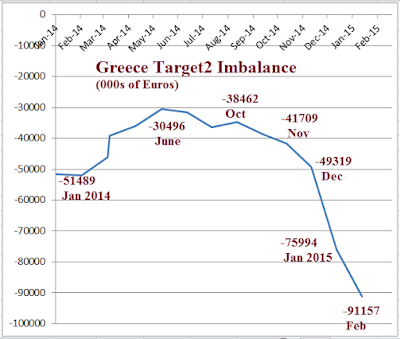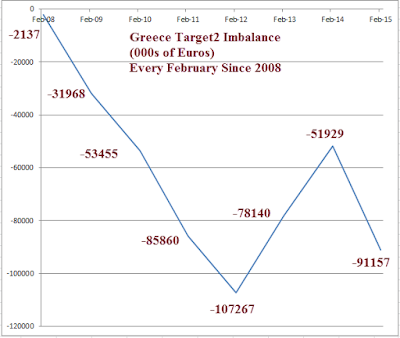Mish's Global Economic Trend Analysis |
- Oligarchs and their "Pocket Armies" Take Over Oil Company in Kiev; Ukraine Begs for More Money; Three-Way Civil War?
- Idle (and Extremely Late) Threat of the Day by Fed's Bullard: Raise Rates or Face ‘Devastating’ Bubbles
- Plotting the Trust (or Lack Thereof) in Greek Banks; Greece Capital Flight in Pictures
- Spanish Anti-Euro Party Podemos Wins 15 Seats in Regional Election
| Posted: 23 Mar 2015 01:39 PM PDT Ukraine Begs for More Money The IMF foolishly agreed to give Ukraine a four-year $40 billion bailout on March 12. Already, Ukraine's Finance Minister Begs for More Money. Natalie Jaresko told the Financial Times in an interview that a four-year, $40bn, IMF-led bailout finalised this month — including restructuring $15bn of debt — was enough to stabilise the financial and banking system. But that was a "first step".Interesting Debate "I end up hearing this burden-sharing argument between different parties. The Americans say the Europeans should do more, the Europeans say the Americans should do more. That's an interesting debate, but no one's paying a greater cost than the Ukrainian people," said Jaresko. Yes, it is an interesting debate. But missing from the debate is a Ukraine civil war that is still ongoing. Money to rebuild shattered infrastructure will do no such thing. Instead it will go for more war-mongering. Money will also go straight into the pockets of the corrupt officials running the country and the corrupt oligarchs battling to take over the country. Oligarch Takes Over Oil Company in Kiev The battle over what's left of Ukraine has now reached Kiev with the takeover of oil company Ukrnafta by oligarch Igor Kolomoisky and his private army. Please consider Poroshenko Warns Rival Over 'Pocket Army'. Ukraine's President Petro Poroshenko warned on Monday that no regional governor would be allowed a "pocket army", after armed men took up positions around an oil company in which Igor Kolomoisky, the billionaire oligarch and governor, is battling to retain control.Private "Security" Company Here a picture of what a private security company in Ukraine looks like.  Anecdotes from Ukraine Reader "Ellen" Writes ... Hello Mish,Desperation Increases Reader John whose sister lives in Lviv, Ukraine writes ... Hello MishCarpetbaggers vs. Oligarchs On December 3, I wrote Enter the Carpetbaggers: Ukraine's New Finance Minister a US Citizen, New Economy Minister from Lithuania "Now that Ukraine's gold has been sold off, the only thing left to complete the plundering is to send in the carpetbaggers. That process is now underway. Ukraine's just-named "Finance Minister" is a US citizen, and Ukraine's new "Economy Minister" is from Lithuania. To get around legal issues associated with having foreigners in top level government positions, Ukraine made the appointees Ukrainian citizens. Three-Way Civil War? Kiev was happy with the oligarchs and their private armies (Igor Kolomoisky is rumored to have 10,000), as long as they were battling the separatists. Now it seems the oligarchs have turned on their masters in Kiev. Another overthrow, this time by an oligarch, could easily be in the works. Mike "Mish" Shedlock http://globaleconomicanalysis.blogspot.com |
| Posted: 23 Mar 2015 11:08 AM PDT The laugh of today comes from Fed non-voting member James Bullard who says Raise Rates or Face 'Devastating' Bubbles. The US risks inflating asset price bubbles with "devastating consequences" if it leaves interest rates at zero, according to a senior Federal Reserve official.How Many Ways Can One Person Be Wrong? I agree with Bullard that asset bubble blowups have enormous consequences. The problem is that Bullard apparently does not realize we are already in one of the biggest asset bubbles in history. The asset bubble has already been fed. As far as growth running above trend, Bullard is in outright Fantasyland. Whereas Bullard says the current weakness is "temporary", I confidently predict a recession. It would not surprise me in the least if the US is already in one. Powder Keg Bullard said he was not especially concerned about the high prices already in bond markets because central banks had the tools and the communication abilities to soothe concerns in these areas. "Bond markets already have very high prices and low yields. You could wonder whether that's a powder keg ready to explode, but central banks conduct policy so we can mitigate these concerns." Just like the Fed mitigated the dot-com bust and the housing bust? Do central banks conduct policy to mitigate bubbles or cause them? Squirrels and Blind Nuts Proving that even a blind nut is not always squirrely, Bullard did say something I agree with: Bullard said that the dollar was unlikely to soar much higher when the Fed raised rates as markets had already priced this move into the exchange rate. On second thought, Bullard is likely to be right about the dollar primarily because the Fed is not going to get in as many rate hikes as the market has priced in. Mike "Mish" Shedlock http://globaleconomicanalysis.blogspot.com |
| Plotting the Trust (or Lack Thereof) in Greek Banks; Greece Capital Flight in Pictures Posted: 23 Mar 2015 09:33 AM PDT Greece Capital Flight in Pictures Using Target2 Imbalances as a measure of capital flight and trust that Greeks have in their banks, here are two charts that pretty much tell the full story. Greece Target2 Imbalance January 2014 to February 2015  Between October 2014 and February 2015, over 52 billion euros have fled Greek banks. Go back to June when things appeared to be healing and capita flight is about 60 billion euros. Greece Target2 Imbalance Every February Since 2008  Charts created with data from Euro Crisis Monitor. Target2 Discussion For a discussion of Target2, what it means and how it works, along with a discussion of who is really to blame for the crisis in Europe, please see From ZIRP to NIRP: Virtues of Germany vs. the Vices of Greece; What About "Speece" and Gold? The record Target2 deficit for Greece was 109.315 billion euros in November of 2011. The Greek Target2 deficit exceeded 100 billion euros for 14 of 15 months between September of 2011 and November of 2012. On July 26, 2012 ECB President Mario Draghi said the ECB was "ready to do whatever it takes" to preserve the single currency. "Believe me, it will be enough," said Draghi. Confidence in the euro resumed. With a bit of a lag, confidence in Greek banks also returned. Between February of 2012 and June of 2014 nearly 77 billion euros flowed back into Greek banks. Confidence in Greek banks waned with the rise of Syriza, accelerated ahead of the January 2015 Greek national election, then continued its decline following the election. Runs on Greek Banks The above charts nicely depict capital flight and the run on Greek banks. On January 9, I commented Another Run on Greek Banks Begins; Get Out While You Still Can; Buy Gold On January 25, 2015 I reported Syriza Trounces New Democracy; Greeks Stop Paying Taxes; Run on Greek Banks Escalates; Get Out! Greeks held back paying taxes because they figured Syriza Alexis Tsipras would work out a new deal with the Troika and for Greek taxpayers. A new deal never happened, and the run on the banks continued. In spite of the fact that Greek banks are in need of cash, the ECB has been very reluctant to provide it. See ECB Revokes Greek Bonds as Collateral; ECB vs. Novices; Brass Knuckles. Greece Warns Merkel of 'Impossible' Debt Payments Today the Financial Times reports Greece's Leader Warns Merkel of 'Impossible' Debt Payments. Alexis Tsipras, the Greek prime minister, has warned Angela Merkel that it will be "impossible" for Athens to service debt obligations due in the coming weeks if the EU fails to distribute any short-term financial assistance to the country.No Cash for Greek banks Adding fat to the Greece fire, Spain says No Cash for Athens Until Reforms in Place. Greece's cash-starved government will not receive any money from the eurozone rescue fund until all its proposed reforms have been implemented, the Spanish economy minister has said.Politics Triumphs Over Rational Thinking Spain could benefit from a rule change itself but fearing the rise of the Spanish anti-euro party Podemos, does not want to appease Greece in any way. Recall that Podemos "Economic Manifesto" Calls for Debt Restructuring, Spain to Abandon the "Euro Trap" For further discussion, please see Greecification of Spanish Politics and the Lies of Spain's Ministers. I believe this foolish move will backfire in a big way in the Spanish national elections later this year. Get Out While You Can! If you have money in Greek banks, get it out now! I have been saying that for months, and the smart money is doing just that. Mike "Mish" Shedlock http://globaleconomicanalysis.blogspot.com |
| Spanish Anti-Euro Party Podemos Wins 15 Seats in Regional Election Posted: 23 Mar 2015 12:57 AM PDT Spain has a largely 2-party system, but unlike France, there is no round two if a single political party fails to get a majority. Instead, political parties must form a coalition. And that is precisely what happened in Spanish regional elections over the weekend. Podemos Wins 15 Seats The Guardian reports Spanish Anti-Austerity Party Podemos Wins 15 Seats in Andalusia. Podemos, the Spanish anti-austerity party, will be a prominent force in Andalusia's regional parliament after it won 15 seats in the party's first election since its ally Syriza triumphed in Greece.Political Reality Podemos is not just anti-austerity. Podemos is also anti-euro (see Podemos "Economic Manifesto" Calls for Debt Restructuring, Spain to Abandon the "Euro Trap". "Podemos is now part of Spain's official political reality" quipped my friend Bran who lives in Spain. Political reality is also in play in France over the weekend. See Hollande's Party (PS) Trounced by Sarkaozy (UMP) and Le Pen (FN) in French Local Elections. Mike "Mish" Shedlock http://globaleconomicanalysis.blogspot.com |
| You are subscribed to email updates from Mish's Global Economic Trend Analysis To stop receiving these emails, you may unsubscribe now. | Email delivery powered by Google |
| Google Inc., 1600 Amphitheatre Parkway, Mountain View, CA 94043, United States | |
No comments:
Post a Comment